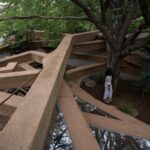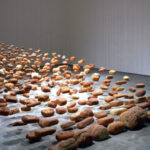“In the end, the term ‘Circularity’ may just be one way to make us aware that we need a more encompassing, integrated, and restorative sustainability path that includes humans as much as technology and nature” – Michiel Schwarz
A couple of months back while casually scrolling through my Instagram feed, I stumbled upon a reel that spoke about a 23-year-old boy from India, Ashay Bhave, who founded a footwear brand ‘Thaely’ which designs shoes made entirely from trash. The brand is on a mission to address plastic pollution while promoting ethical practices and supporting marginalized communities. Ashay witnessed how the plastic waste was not being recycled properly at local waste management facilities, leading to significant pollution and that became his inspiration to invent sustainable sneakers. Thrown-away bags are collected from the domestic neighbourhoods of Delhi, stacked, and compressed to make a canvas-like material. Each pair is crafted utilizing ten plastic bags and twelve plastic bottles. Furthermore, the soles are made from recycled rubber from old shoe soles and automobile worn-out tires, minimizing waste. Even the shoe box is embedded with basil seeds to plant in the soil after use. Their dedication to veganism extends to the production process, where vegan glue is used for binding, and vegan detergents are employed for sanitization.

Reading ‘Cradle-to-Cradle’ by Michael Braungart and William McDonough immediately circled my thoughts back to ‘Thaely’. The notion discussed in the book, ‘Waste is Food’, correlates to one of the key principles of the brand. The plastic waste collected from the neighbourhoods becomes the main source of inventory for the production of the sneakers.The techniques used for pre and post-production also ensure minimal impact on the environment, which reminds me of an instance mentioned in the book about the composition of a fabric made of wool and ramie, and how the effluent of the factory production was cleaner than the influent. The circularity we see in both instances is extremely important in the long haul to make the world a better place for future generations to come.
While discussing the book with the reading group, my thoughts revolved around the authors’ takes and suggestions around the effective ways of waste management. While I mostly understood and figuratively nodded along to most of their arguments, I also thought that the approach was idealistic, and if with an intent of large-scale implementation, various social, economic, and political factors would have to be taken into consideration. Bridging the gap between an idealistic concept and the realistic manifestation of the same would mandate substantial time and energy but with emerging practices like that of ‘Thaely’, I hope that we cover the distance, slowly but steadily.
References –
Michael Braungart and William McDonough, 2002. “Cradle to Cradle: Remaking the Way We Make Things”. pg 92-117








gmarmont
3 November 2023 — 11:25
Another very valuable post, Varsha. I think you could take your already constructive observations a step further by critically unpacking the challenges and potentials you see in the design intervention you discuss – for example, what do you mean exactly by ‘idealistic’? Is idealism required to explore alternatives? Is it an impediment to tackle immediate concerns and material conditions in the here and now? Etc.